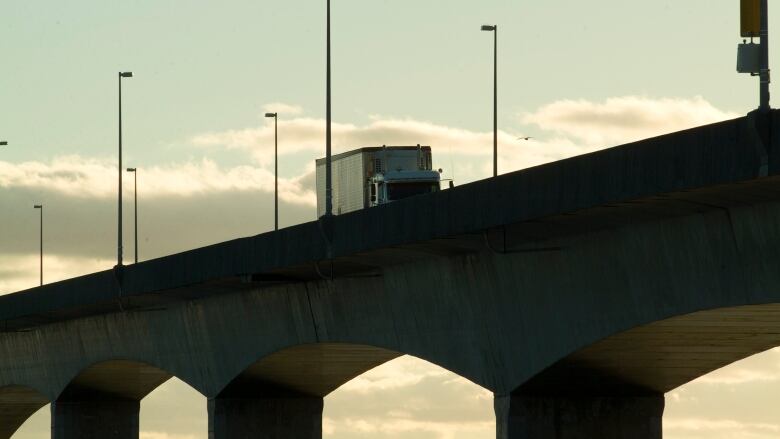Island truck driver welcomes new rules around self-isolation
'It's a massive weight off'

An Island truck driversays he'shappy with changes to the rules around self-isolatingupon returning to P.E.I.
Provincial officials announced the changes to those rules Monday.
"I think it's fantastic," said Patrick O'Brien, a long-haul truck driver for the past 15 years.
"For mental health purposes, physical health just everything in general family health. Just being able to have that interaction."
O'Brien said he has been self-isolating in his home after every trip. It has been difficultto explain to his five-year-old son, whocouldn't understand why he couldn't be nearhis father.

The normal route that O'Brien takes is to head to New York, up to Toronto and then back to the Maritime provinces.
With the rule changes, those travelling off-Island within Canada and the U.S. can now agree to be tested weekly or when they return.
They are onlyrequired to self-isolate after the initial test, an estimated 36-48 hours, and if the results are negative, they don't need to self-isolate while they're at home.
'Mentally depleting'
O'Brien estimates he was on the road for five days and then home on the Island for two, and saidhehas had very limited contact with people off-Island.
"Because of all the restrictions, I wouldn't have interaction with five people a week when I was at work and two of them would be customs officers one southbound, one northbound the other interactions are behind Plexiglas," O'Briensaid.
Then he would be back at home in self-isolation, a routine he has kept up since mid-March.
"You could do it for a week or two, it doesn't really affect you mentally,"O'Brien said.
"But if you are doing it long term it's quite, mentally depleting I guess I'd say, you just feel alone all the time."
Rules changedMonday
Under the new rules, truck drivers arestillasked to limit interactionsand keep a journal of all the people they interact with in person, for contact-tracing purposes.
Drivers don't need to self-isolate each time they returnonce they areon a regular testing schedule.

Truck drivers who have only travelled to New Brunswick no longer have to self-isolate, but do have to monitor for symptoms of COVID-19.
Anyone who develops symptoms is asked to self-isolate and call the province's 811 number.
Those who are not willing to have the regulartesting done will still be required to self-isolate for 14 days, or until they return to work on the road.
Council worked with public health officials
The P.E.I. Trucking Sector council worked with the government to help come up with the adjustment of the restrictions.
"If you take a look at our drivers that have been kind of caught in this continual cycle, this is going to allow them to break that,"said Brian Oulton, the council's executive director.
"For the most part, they haven't been able to hug or kiss their spouse, or if you have young kids, pick up your kids and play with them so this is game changing and very important to them."

Oulton said they worked with public health officials to expand the testing locations to include the bridge to make it easier for returning drivers to be tested, without having to take a second trip to another Island testing clinic.
"We have to give our thanks to Chief Public Health Office," Oulton said. "They've always come up with solutions and I think this was even better than we hoped for."
O'Brien said it was important for those in the industry to see an end to the cycle of self-isolation.
"When I see an end game in sight, that that's the last time I'll have to isolate as long as I don't have symptoms or have a positive test, it's a massive weight off," he said.
"Just a sense of, kind of, somewhat of a normal life again."
COVID-19: What you need to know
What are the symptoms of COVID-19?
Common symptoms include:
- Fever.
- Cough.
- Tiredness.
But more serious symptoms can develop, including difficulty breathing and pneumonia, which can lead to death.
Health Canada has built aself-assessment tool.
What should I do if I feel sick?
Isolate yourself and call 811. Do not visit an emergency room or urgent care centre to get tested. A health professional at 811 will give you advice and instructions.
How can I protect myself?
- Wash your hands frequently and thoroughly.
- Avoid touching your eyes, nose and mouth.
- Clean regularly touched surfaces regularly.
- Practisephysical distancing.
More detailed information on the outbreak is available on thefederal government's website.
More COVID-19 stories from CBC P.E.I.
With files from Isabella Zavarise












_(720p).jpg)


 OFFICIAL HD MUSIC VIDEO.jpg)
.jpg)



























































































